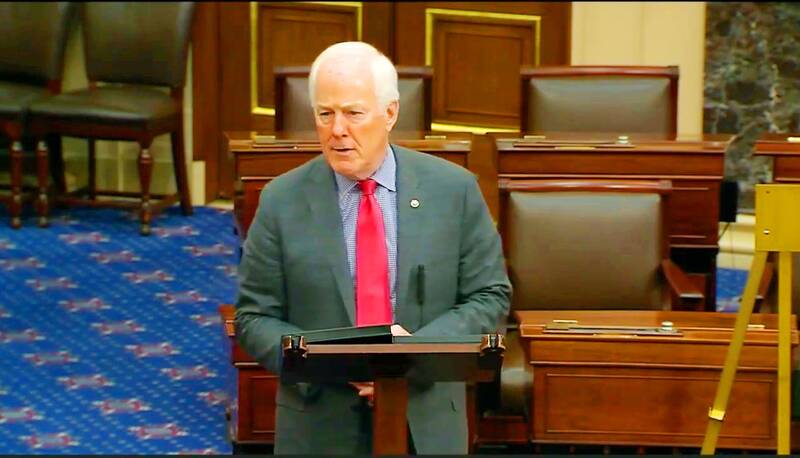Four US senators have introduced bipartisan legislation that would require the US Department of the Treasury to terminate the US-China Tax Treaty within 30 days after a presidential determination that China has initiated an armed attack against Taiwan.
The senators are Republicans John Cornyn and Bill Cassidy, and Democrats Chris Coons and Catherine Cortez Masto.
“The United States must make it crystal clear the Chinese Communist Party will face dire consequences if it moves to invade Taiwan,” Cornyn said on Tuesday.

Photo: Screengrab from YouTube
“The security of our partners in the Indo-Pacific is critical to American trade objectives, regional stability and fostering democracy around the world,” Coons said. “That’s why I am proud to cosponsor this bipartisan legislation to signal that potential aggression from the Chinese against Taiwan would be seriously detrimental to our economic relationship and incur immediate, severe consequences.”
Penalizing China for attacking US allies is “common sense,” Cassidy said.
“This legislation will help deter aggression in the region by making it clear that the US will not give favorable tax treatment to countries that make war on their neighbors,” Cortez said.
According to Article 28 of the US-China Tax Treaty, either side can terminate the treaty provided they inform the other of the decision six months in advance.

MAKING WAVES: China’s maritime militia could become a nontraditional threat in war, clogging up shipping lanes to prevent US or Japanese intervention, a report said About 1,900 Chinese ships flying flags of convenience and fishing vessels that participated in China’s military exercises around Taiwan last month and in January last year have been listed for monitoring, Coast Guard Administration (CGA) Deputy Director-General Hsieh Ching-chin (謝慶欽) said yesterday. Following amendments to the Commercial Port Act (商港法) and the Law of Ships (船舶法) last month, the CGA can designate possible berthing areas or deny ports of call for vessels suspected of loitering around areas where undersea cables can be accessed, Oceans Affairs Council Minister Kuan Bi-ling (管碧玲) said. The list of suspected ships, originally 300, had risen to about

DAREDEVIL: Honnold said it had always been a dream of his to climb Taipei 101, while a Netflix producer said the skyscraper was ‘a real icon of this country’ US climber Alex Honnold yesterday took on Taiwan’s tallest building, becoming the first person to scale Taipei 101 without a rope, harness or safety net. Hundreds of spectators gathered at the base of the 101-story skyscraper to watch Honnold, 40, embark on his daredevil feat, which was also broadcast live on Netflix. Dressed in a red T-shirt and yellow custom-made climbing shoes, Honnold swiftly moved up the southeast face of the glass and steel building. At one point, he stepped onto a platform midway up to wave down at fans and onlookers who were taking photos. People watching from inside

Japan’s strategic alliance with the US would collapse if Tokyo were to turn away from a conflict in Taiwan, Japanese Prime Minister Sanae Takaichi said yesterday, but distanced herself from previous comments that suggested a possible military response in such an event. Takaichi expressed her latest views on a nationally broadcast TV program late on Monday, where an opposition party leader criticized her for igniting tensions with China with the earlier remarks. Ties between Japan and China have sunk to the worst level in years after Takaichi said in November that a hypothetical Chinese attack on Taiwan could bring about a Japanese

STREAMLINED: The dedicated funding would allow the US to transfer equipment to Taiwan when needed and order upgraded replacements for stockpiles, a source said The US House of Representatives on Thursday passed a defense appropriations bill totaling US$838.7 billion, of which US$1 billion is to be allocated to reinforcing security cooperation with Taiwan and US$150 million to replace defense articles provided to the nation. These are part of the Consolidated Appropriation Act, which the US House yesterday passed with 341 votes in favor and 88 against. The act must be passed by the US Senate before Friday next week to avoid another government shutdown. The US House Committee on Appropriations on Monday unveiled the act, saying that it allocates US$1 billion for the Taiwan Security Cooperation Initiative